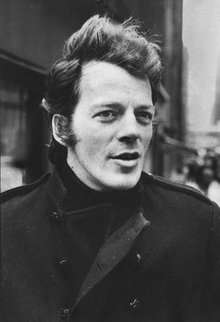Emmett Grogan

Emmett Grogan (born Eugene Grogan, November 28, 1942–April 6, 1978) was a founder of the Diggers, a radical community-action group of Improvisational actors in the Haight-Ashbury district of San Francisco, California. The Diggers took their name from the English Diggers (1649-1650), a radical movement opposed to feudalism, the Church of England and the British Crown.
The San Francisco Diggers were a legendary group that evolved out of two radical traditions that thrived in the Bay Area in the mid-1960s: the bohemian/underground art/theater scene, and the New Left/civil rights/peace movement. The Diggers combined street theater, direct action, and art happenings in their social agenda of creating a Free City. Their most famous activities revolved around distributing free food[1] ("Free because it's yours!") every day in the park, and distributing "surplus energy" at a series of Free Stores (where everything in stock was without a price tag).[2]
The Diggers coined various slogans that became part of the counterculture and even the larger society, such as, "Do your own thing" and "Today is the first day of the rest of your life." The Diggers ultimately inspired Abbie Hoffman[3] to undertake a similar venture on the Lower East Side of New York City during the mid-1960s. The Diggers of the 1960s also inspired present-day Food Not Bombs groups who distribute free food to the hungry.
Grogan's distrust of the mainstream media made it difficult for reporters to acquire more than a few details of his life. He was born on November 28, 1942 as Eugene Leo Grogan into an Irish-American family in the Bay Ridge neighborhood of Brooklyn, New York. "Grogan grew up on New York City’s mean streets, getting hooked on heroin before he was in his teens, kicking the habit and winning a scholarship to a swanky Manhattan private school, pursuing a highly profitable sideline as a Park Avenue burglar, then skipping town to enjoy the dolce vita in Italy."[4] After high school, he attended Duke University for one year before moving to San Francisco. Grogan was also the author of Final Score, a crime novel. He married the French-Canadian actress Louise LaTraverse and had one son, Max.
Grogan's 1972 autobiography Ringolevio, a Life Played for Keeps is regarded by some[5] as the best and only authentic book written about the underground culture of the 1960's. In the book, Grogan refers to himself by the alias "Kenny Wisdom". Peter Coyote, in the 1990 introduction to Ringolevio states that Grogan's choice of that alias is "no accident"[6] but without elaborating.
Bob Dylan dedicated his 1978 album Street Legal to Grogan.[7] Richard Brautigan dedicated the poem Death is a Beautiful Car Parker Only to Grogan.[8]
On April 6, 1978, 35-year-old Grogan was found dead on a New York City subway train on the F line in Coney Island; he had suffered a heart attack.[9] Close friend and Digger co-founder Peter Coyote stated in his foreword to Grogan's autobiography "Ringolevio" that his death was due to a heroin overdose.
Criticism of counterculture
Grogan shunned media attention, and became increasingly suspicious of those who sought publicity. In Ringolevio Grogan discussed the 1967 Human Be-In, criticizing counterculture luminaries Timothy Leary, Jerry Rubin, and especially Abbie Hoffman.[10] "[Ringolevio] is a hard-boiled, sometimes hard-to-believe, wildly entertaining tale that takes a totally unexpected turn when Grogan washes up in sixties San Francisco and becomes a leader of the anarchist group known as the Diggers. The Diggers, devoted to street theater, direct action, and distributing free food, were in the thick of the legendary Summer of Love, and soon Grogan is struggling with the naive narcissism of the hippies, the marketing of revolution as a brand, dogmatic radicals, and false prophets like tripster Timothy Leary."[4]
Grogan thought the HIP (Haight Independent Proprietors) merchants led by Ron and Jay Thelin, who had sponsored events like the Human Be-In, were the primary beneficiaries of the events: "The HIP merchants were astounded by their own triumph by promoting such a large market for their wares. They became the Western world's taste makers overnight..." He objected to the "Summer of Love" enticing of young people to the Haight-Ashbury to experience hippie life, noting that an influx of residents would cause an "immigration crisis" and the kids who came expecting an already-formed Utopia would end up living a desperate hand-to-mouth existence on the streets. He also decried the HIP merchants' "HIP Job Co-Op", revealing that much of the work they offered was sweatshop labor. He pointed out that unskilled and clerical jobs would be taken away from poor residents who depended on such work to survive.[11]
References
- ↑ Overview: who were (are) the Diggers?
- ↑ Digger Virtual Free Store
- ↑ Sleeping Where I Fall: A Chronicle pg.71
- 1 2 "nyrb: Ringolevio". Retrieved 18 Oct 2015.
- ↑ Dennis Hopper, quoted at http://www.nyrb.com/products/ringolevio?variant=1094931109
- ↑ Ringolevio, a Life Played for Keeps, Little Brown, 1990 edition
- ↑ Street Legal
- ↑ http://brautigan.cybernetic-meadows.net/tiki-index.php?page=Emmett+Grogan, accessed 2016 Nov. 15
- ↑ Emmett Grogan obituary, New York Times April 8, 1978.
- ↑ Ringolevio
- ↑ Ringolevio: A Life Played for Keeps excerpts concerning Grogan's work in the Haight-Ashbury.
Further reading
- Grogan, Emmett (2008). Ringolevio: A Life Played for Keeps. New York Review Books. ISBN 1-59017-286-8.